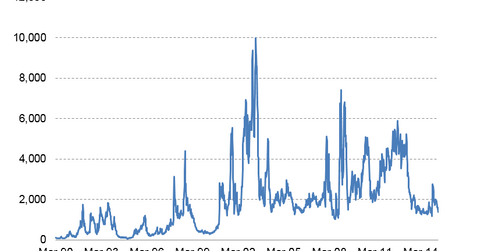Mortgage Refinances Are Hit by Prepayment Burnout
Refinancing activity affects prepayment speeds. Prepayment speeds occur because homeowners are allowed to pay off their mortgages early and without penalty.
June 12 2015, Updated 9:06 a.m. ET

MBA Refinance Index increases
Mortgage refinance applications, as measured by the MBA (Mortgage Bankers Association) Refinance Index, rose 7% from 1,360 to 1,455. Since mid-2013, refinances have been dropping like a stone. The people with home equity have already refinanced. The ones left with high rates are underwater. However, there has been a slight rebound because rates came back down.
The MBA reported that the share of refinance applications decreased to 48.9%. The bond market rally of late 2014 and early 2015 caught many by surprise. However, it was a welcome surprise for mortgage originators who had a horrendous 2014 and were expecting the normal slow first quarter. Slowing refinance activity was a negative for originators, including Wells Fargo (WFC) and JPMorgan Chase (JPM).
Implications for mortgage REITs
Refinancing activity affects prepayment speeds—a critical driver of mortgage REIT returns. Prepayment speeds occur because homeowners are allowed to pay off their mortgages early and without penalty. When interest rates fall, those who can refinance at a lower rate do. This is good for homeowners. However, it isn’t necessarily good for mortgage lenders, especially REITs.
When homeowners prepay, the investor loses a high-yielding asset and is forced to reinvest the proceeds in a lower-rate investment. This means lower returns going forward. A rise in prepayment speeds could negatively affect REITs, especially those with large exposure to fixed-rate, government-guaranteed mortgages like American Capital Agency (AGNC) and Annaly Capital Management (NLY). That said, prepayment burnout has been relatively pronounced at these interest rate levels. Any further refinances will be driven more by home price appreciation.
REITs that invest in non-agency REITS, like Nationstar (NSM) and Two Harbors (TWO), might find that swapping credit risk for interest rate risk is a good idea. Investors interested in gaining access to the mortgage REIT sector as a whole should look at the iShares Mortgage Real Estate Fund (REM).
